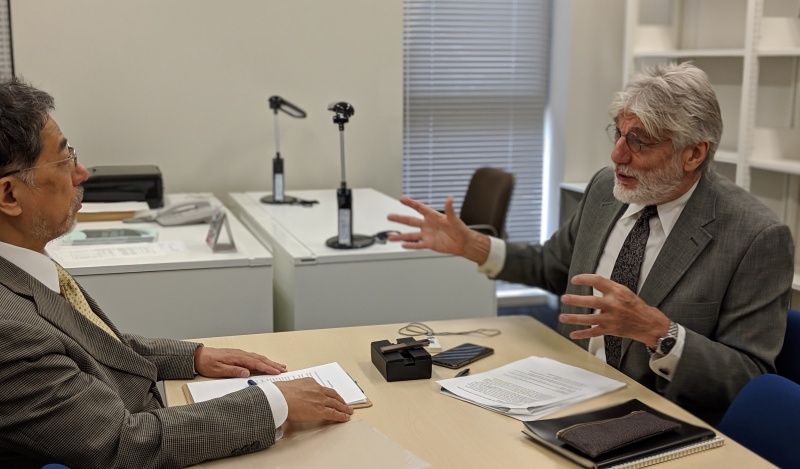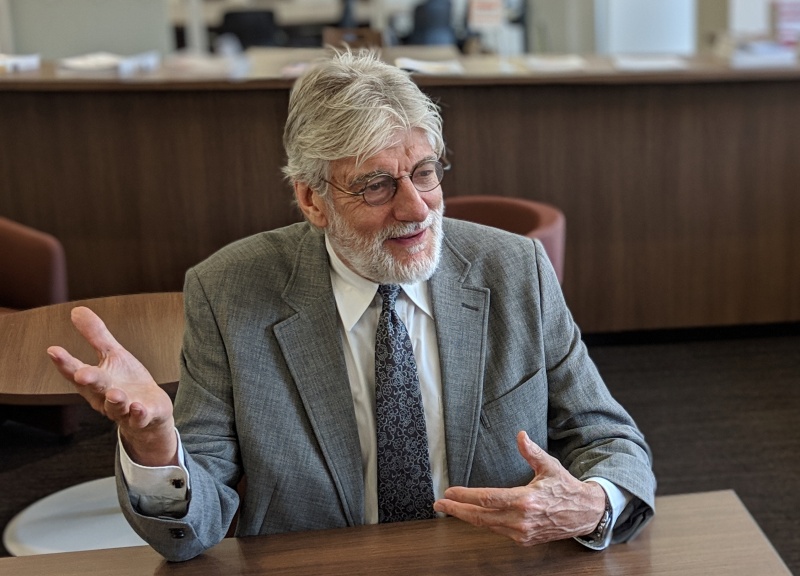Director’s Interview with Professor Anthony Brewer
-- Interviewer (Director Kosugi): Thank very much for your contribution to the last year’s English writing support program.
Professor Brewer: It was a wonderful experience. I enjoyed it immensely.
--- First Professor Brewer, could you tell us your experience in general of editorial work?
Professor Brewer: I've been editing English manuscripts for about 30 years. Originally, I came to Japan as a teacher, but there was a demand for high-quality English editing so this became my main work. Over a long time, I've edited a variety of manuscripts from universities, government institutions, companies and individual professors.
--- Can you explain your works in terms of academic disciplines?
Professor Brewer: It's a very wide spectrum, mainly humanities and social sciences, but also natural and applied sciences from engineering to health. It is a skill which has grown from many years of study and practice.
--- I see. You have some experience in working for British publishers, right?
Professor Brewer: Yes. It was in London.
--- Would you please tell me from your experience what Japanese authors find difficult when they write in English?
Professor Brewer: You might expect the answer to be the many grammatical and structural differences between Japanese and English, but often writers are unaware when they make these mistakes. However, they do make it difficult for the reader to unravel the intended meaning, which is why it's essential to have your work edited if you are publishing internationally. blockquote
--- So, it isn’t about definite articles and indefinite ones?
Professor Brewer: No. In my experience the biggest difficulty, even for advanced Japanese writers, is deciding on the most suitable words to express the meaning, as certain words are used only in specific contexts.

--- So now what in your opinion is the difference between academic writing and non-academic writing?
Professor Brewer: Academic writing is about presenting the facts in a somewhat formal, structured and logical fashion, while non-academic writing is often a form of personal expression, unless you're reporting the news. Moreover, academic writing is a specific discipline, with specific rules and expressions. Eloquent, lengthy sentences should be avoided.
--- Rhetorical expressions are not recommended?
Professor Brewer: It’s because we're trying to transfer knowledge and our readers might not be native English speakers, so we need to keep it simple, logical and straightforward.
--- I think that's a very important point that you said that English articles are read by native English speakers, but also vast numbers of readers are not native in English and of course we have to make our writing proper in a native context but it is very true that logical clear expression is more important in a sense than stylistic decoration. Is that right?
Professor Brewer: Exactly. When you are presenting or teaching, explaining your ideas logically, clearly and directly, is more effective than speaking perfect English.
--- I think that the Global academic world is such that we basically communicate in a common English which is somewhat intellectually accurate, and somewhat grammatically right, rather than what people expect of a native speaker.
Professor Brewer: Yes, and that's acceptable as long as the meaning is clear and straightforward.
-- Please tell me about our program last year? How did you conduct the program?
Professor Brewer: Well our program is named 'Advanced Support for Academic Writing in English'. It was initiated, when the new academic journal of the Institute was planned, in order to facilitate young researchers’ writing in English. In the first session we introduced the concept of AJI journal and our goals, the basic rules for structuring and writing an academic paper, and formatting a manuscript using our AJI style sheet. Then in the workshops, I reviewed common mistakes in writing English, and advised them how to avoid redundancy. Next we provided individual tutorials as our applicants were from different countries, backgrounds and disciplines. We gave individuals coaching on how to write each section with in depth feedback and advice.

-- So it's a kind of gradual individual focused tutorial method?
Professor Brewer: Exactly.
--- So the participants developed their paper stage by stage?
Professor Brewer: Right. It is not just about writing grammatically correct papers. For example a coach in any sport first teaches players how to play properly according to the rules, but the coach's expertise is to bring out the players' potential to excel and to win. In a similar way, our program is intended to coach our participants to become excellent performers in their fields.
--- How did you find the program last year?
Professor Brewer: Last year, many of the participants showed tremendous progress. Their confidence and enthusiasm drastically increased. I was very happy.
--- What are the merits of this particular program?
Professor Brewer: From my experience all non-native English writers can benefit. If you join our program you will learn to write research papers that can be presented with confidence in any part of the academic world. Your English writing will improve, your confidence will improve, your ability to present your research to others in English will improve, and inevitably your academic career must improve.
--- Is there anything you would like to say this year's prospective participants??
Professor Brewer: As we mention in the workshops, all of us learn by making mistakes. I encourage you to write and not be afraid to make mistakes. The more red ink you find the more you will be able to improve. And don't be shy to ask questions, especially if you need clarification. We all learn by asking questions. Finally, I just want to say that we are here to help you, and your success is our reward. We are looking forward to meeting you very much.
--- Thank you.